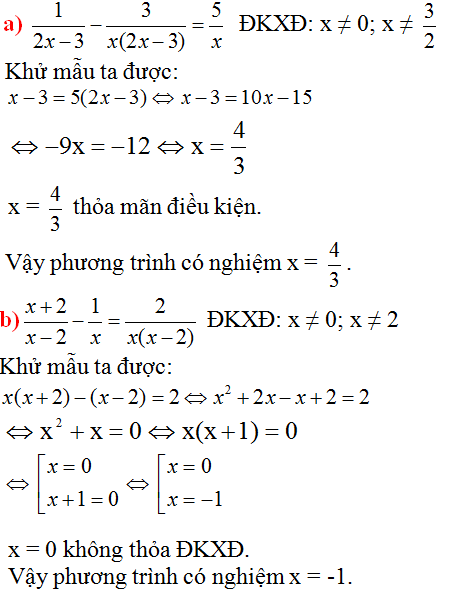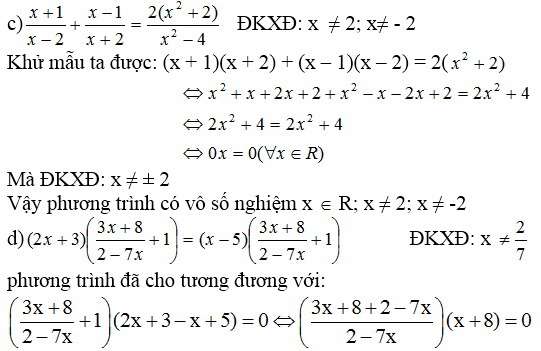Hãy nhập câu hỏi của bạn vào đây, nếu là tài khoản VIP, bạn sẽ được ưu tiên trả lời.

a, \(\dfrac{x^2-x}{x-2}+\dfrac{4-3x}{x-2}\)
\(=\dfrac{x^2-x+4-3x}{x-2}=\dfrac{x^2-4x+4}{x-2}\)
c) \(\dfrac{2}{x^2-9}+\dfrac{1}{x+3}\)
Ta có: \(\dfrac{1}{x+3}=\dfrac{1\left(x-3\right)}{\left(x+3\right)\left(x-3\right)}=\dfrac{x-3}{x^2-9}\)
\(\Rightarrow\dfrac{2}{x^2-9}+\dfrac{1}{x+3}=\dfrac{2}{x^2-9}+\dfrac{x-3}{x^2-9}=\dfrac{2+x-3}{x^2-9}=\dfrac{x-1}{x^2-9}\)

câu nào cũng ghi lại đề nha
a) \(x\left(x-1\right)=0\)
\(\Leftrightarrow\left[{}\begin{matrix}x=0\\x-1=0\end{matrix}\right.\Leftrightarrow\left[{}\begin{matrix}x=0\\x=1\end{matrix}\right.\)
b)\(x\left(x-2\right)=0\)
\(\Leftrightarrow\left[{}\begin{matrix}x=0\\x=2\end{matrix}\right.\)
c) \(\left(x+1\right)\left(x+2\right)+\left(x+2\right)\left(x-2\right)=0\)
\(\Leftrightarrow\left(x+2\right)\left(x+1+x-2\right)=0\)
\(\Leftrightarrow\left(x+2\right)\left(2x-1\right)=0\)
\(\Leftrightarrow\left[{}\begin{matrix}x=-2\\x=\dfrac{1}{2}\end{matrix}\right.\)
d) \(\dfrac{1}{x-2}+3-\dfrac{3-x}{x-2}=0\)
\(\Leftrightarrow\dfrac{1+3\left(x-2\right)-\left(3-x\right)}{x-2}=0\)
\(\Leftrightarrow\dfrac{1+3x-6-3+x}{x-2}=0\) ( đk \(x\ne2\) )
\(\Leftrightarrow4x-8=0\Rightarrow x=2\)
đ) \(\dfrac{8-x}{x-7}-8-\dfrac{1}{x-7}=0\)
\(\Leftrightarrow\dfrac{8-x-8\left(x-7\right)-1}{x-7}=0\) (đk \(x\ne7\))
\(\Leftrightarrow8-x-8x+56-1=0\)
\(\Leftrightarrow-9x+63=0\)
\(\Leftrightarrow x=7\)

a ) \(\dfrac{1}{x+1}-\dfrac{5}{x-2}=\dfrac{15}{\left(x+1\right)\left(2-x\right)}\)(1)
ĐKXĐ : \(x\ne1;x\ne2\)
(1)\(\Leftrightarrow\dfrac{1}{x+1}+\dfrac{5}{2-x}=\dfrac{15}{\left(x+1\right)\left(2-x\right)}\)
\(\Leftrightarrow2-x+5x+5=15\)
\(\Leftrightarrow4x+7=15\\\)
\(\Leftrightarrow4x=8\)
\(\Leftrightarrow x=2\left(KTMĐKXĐ\right)\)
Vậy pt vô nghiệm .
b ) \(1+\dfrac{x}{3-x}=\dfrac{5x}{\left(x+2\right)\left(3-x\right)}+\dfrac{2}{x+2}\) ( 2 )
ĐKXĐ : \(x\ne3;x\ne-2\)
(2) \(\Leftrightarrow3x-x^2+6-2x+x^2+2x=3x+6-x^2-2x\)
\(\Leftrightarrow x^2+2x=0\)
\(\Leftrightarrow x\left(x+2\right)=0\)
\(\Leftrightarrow\left[{}\begin{matrix}x=0\left(TMĐKXĐ\right)\\x=-2\left(KTMĐKXĐ\right)\end{matrix}\right.\)
Vậy tập nghiệm của phương trình là S={0}.
c ) \(\dfrac{6}{x-1}-\dfrac{4}{x-3}=\dfrac{8}{\left(x-1\right)\left(3-x\right)}\) (3)
ĐKXĐ : \(x\ne1;x\ne3\)
\(\left(3\right)\Leftrightarrow\dfrac{6}{x-1}+\dfrac{4}{3-x}=\dfrac{8}{\left(x-1\right)\left(3-x\right)}\)
\(\Leftrightarrow6\left(3-x\right)+4\left(x-1\right)=8\)
\(\Leftrightarrow18-6x+4x-4=8\)
\(\Leftrightarrow-2x=6\)
\(\Leftrightarrow x=-3\)
Vậy tập nghiệm của phương trình là S={-3}
d ) \(\dfrac{x+2}{x-2}-\dfrac{1}{x}=\dfrac{2}{x\left(x-2\right)}\) (4)
ĐKXĐ : \(x\ne0;x\ne2\)
\(\left(4\right)\Leftrightarrow x^2+2x-x+2=2\)
\(\Leftrightarrow x^2+x=0\)
\(\Leftrightarrow x\left(x+1\right)=0\)
\(\Leftrightarrow\left[{}\begin{matrix}x=0\left(KTMĐKXĐ\right)\\x=-1\left(TMĐKXĐ\right)\end{matrix}\right.\)
Vậy tập nghiệm của phương trình là S={-1}
a) \(\dfrac{1}{x+1}-\dfrac{5}{x-2}=\dfrac{15}{\left(x+1\right)\left(2-x\right)}\) ( đk: x ≠ -1; x ≠ 2 )
\(\Leftrightarrow\) \(\dfrac{1}{x+1}+\dfrac{5}{2-x}=\dfrac{15}{\left(x+1\right)\left(2-x\right)}\)
\(\Leftrightarrow\) \(2-x+5\left(x+1\right)=15\)
\(\Leftrightarrow\) \(2-x+5x+5=15\)
\(\Leftrightarrow\)\(4x=8\)
\(\Rightarrow\) \(x=2\) ( KTM )
S = ∅
b) \(1+\dfrac{x}{3-x}=\dfrac{5x}{\left(x+2\right)\left(3-x\right)}+\dfrac{2}{x+2}\) ( đk: x ≠ - 2 ; x ≠ 3 )
\(\Leftrightarrow\) \(\left(x+2\right)\left(3-x\right)+x\left(x+2\right)=5x+2\left(3-x\right)\)
\(\Leftrightarrow\) \(3x-x^2+6-2x+x^2+2x=5x+6-2x\)
\(\Leftrightarrow\) \(3x+6=3x+6\)
\(\Rightarrow\)\(0x=0\) ( TM )
\(\Rightarrow\) Phương trình vô số nghiệm
S = R
c) \(\dfrac{6}{x-1}-\dfrac{4}{x-3}=\dfrac{8}{\left(x-1\right)\left(3-x\right)}\) ( đk: x ≠ 1 ; x ≠ 3 )
\(\Leftrightarrow\) \(\dfrac{6}{x-1}+\dfrac{4}{3-x}=\dfrac{8}{\left(x-1\right)\left(3-x\right)}\)
\(\Leftrightarrow\)\(6\left(3-x\right)+4\left(x-1\right)=8\)
\(\Leftrightarrow\) \(18-6x+4x-4=8\)
\(\Leftrightarrow\) \(-2x=-6\)
\(\Rightarrow x=3\) ( KTM )
S = ∅
d) \(\dfrac{x+2}{x-2}-\dfrac{1}{x}=\dfrac{2}{x\left(x-2\right)}\) (đk: x ≠ 2; x ≠ 0 )
\(\Leftrightarrow\) \(x\left(x+2\right)-x+2=2\)
\(\Leftrightarrow\) \(x^2+2x-x+2=2\)
\(\Leftrightarrow\) \(x^2+x=0\)
\(\Leftrightarrow\) \(x\left(x+1\right)=0\)
\(\Rightarrow\left\{{}\begin{matrix}x=0\\x+1=0\end{matrix}\right.\) \(\Rightarrow\left\{{}\begin{matrix}x=0\left(KTM\right)\\x=1\left(TM\right)\end{matrix}\right.\)
S = \(\left\{2\right\}\)

b: \(=\left[\dfrac{2}{3x}-\dfrac{2}{x+1}\cdot\dfrac{x+1-3x^2-3x}{3x}\right]\cdot\dfrac{x}{x+1}\)
\(=\left(\dfrac{2}{3x}-\dfrac{2}{x+1}\cdot\dfrac{-3x^2-2x+1}{3x}\right)\cdot\dfrac{x}{x+1}\)
\(=\dfrac{2x+2+6x^2+4x-2}{3x\left(x+1\right)}\cdot\dfrac{x}{x+1}\)
\(=\dfrac{6x^2+6x}{3\left(x+1\right)}\cdot\dfrac{1}{x+1}\)
\(=\dfrac{6x\left(x+1\right)}{3\left(x+1\right)^2}=\dfrac{2x}{x+1}\)
c: \(VT=\left[\dfrac{2}{\left(x+1\right)^3}\cdot\dfrac{x+1}{x}+\dfrac{1}{\left(x+1\right)^2}\cdot\dfrac{1+x^2}{x^2}\right]\cdot\dfrac{x^3}{x-1}\)
\(=\left(\dfrac{2}{x\left(x+1\right)^2}+\dfrac{x^2+1}{x^2\cdot\left(x+1\right)^2}\right)\cdot\dfrac{x^3}{x-1}\)
\(=\dfrac{2x+x^2+1}{x^2\cdot\left(x+1\right)^2}\cdot\dfrac{x^3}{x-1}\)
\(=\dfrac{\left(x+1\right)^2}{\left(x+1\right)^2}\cdot\dfrac{x}{x-1}=\dfrac{x}{x-1}\)

a.
\(\dfrac{1}{2}\left(x+1\right)+\dfrac{1}{4}\left(x+3\right)=3-\dfrac{1}{3}\left(x+2\right)\)
\(\Leftrightarrow\dfrac{x+1}{2}+\dfrac{x+3}{4}=3-\dfrac{x+2}{3}\)
\(\Leftrightarrow\dfrac{\left(x+1\right).6}{12}+\dfrac{\left(x+3\right).3}{12}=\dfrac{36}{12}-\dfrac{\left(x+2\right).4}{12}\)
\(\Leftrightarrow6x+6+3x+9=36-4x-8\)
\(\Leftrightarrow9x+15=28-4x\)
\(\Leftrightarrow9x+4x=28-15\)
\(\Leftrightarrow13x=13\)
\(\Leftrightarrow x=1\)
a) \(\dfrac{1}{2}\left(x+1\right)+\dfrac{1}{4}\left(x+3\right)=3-\dfrac{1}{3}\left(x+2\right)\)
\(\Leftrightarrow\dfrac{6\left(x+1\right)+3\left(x+3\right)}{12}=\dfrac{36-4\left(x+2\right)}{12}\)
\(\Leftrightarrow6\left(x+1\right)+3\left(x+3\right)=36-4\left(x+2\right)\)
\(\Leftrightarrow6x+6+3x+9=36-4x-8\)
\(\Leftrightarrow9x+15=-4x+28\)
\(\Leftrightarrow9x+4x=28-15\)
\(\Leftrightarrow13x=13\)
\(\Leftrightarrow x=1\)
Vậy ................................



a) x - 3 = (3 - x)²
x - 3 = (x - 3)²
x - 3 - (x - 3)² = 0
(x - 3)[1 - (x - 3)] = 0
(x - 3)(1 - x + 3) = 0
(x - 3)(4 - x) = 0
x - 3 = 0 hoặc 4 - x = 0
*) x - 3 = 0
x = 3
*) 4 - x = 0
x = 4
Vậy x = 3; x = 4
b) x³ + 3/2 x² + 3/4 x + 1/8 = 1/64
(x + 1/2)³ = 1/64
(x + 1/2)³ = (1/4)³
x + 1/2 = 1/4
x = 1/4 - 1/2
x = -1/2
a) Ta có: �−3=(3−�)2x−3=(3−x)2
(�−3)−(�−3)2=0(x−3)−(x−3)2=0
(�−3)(4−�)=0(x−3)(4−x)=0
�∈{3;4}x∈{3;4}.
b) Ta có: �3+32�2+34�+18=164x3+23x2+43x+81=641
(�+12)3=(14)3(x+21)3=(41)3
�+12=14x+21=41
�=−14x=4−1.